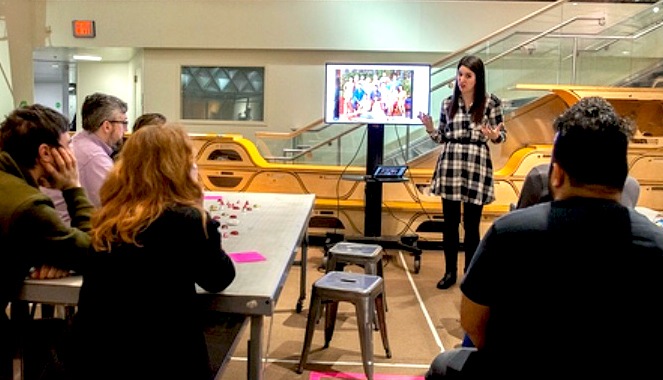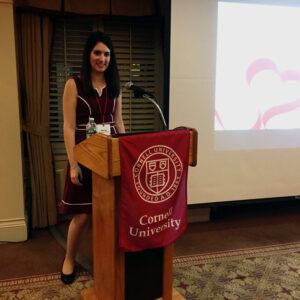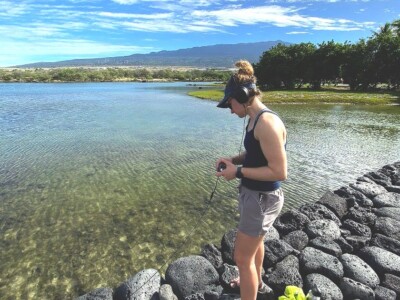For some, Valentine’s Day carries heady expectations. Maybe you imagine your partner reading you poetry at dusk while floating in a tidepool, with beeswax candles burning and Yo-Yo Ma playing Bach concertos in the background. Or maybe you want to skip the fuss and enjoy a forest tromp with your favorite four-legged friend.
All of us have different ways of celebrating our love and different ways of showing up in our relationships. Yet, we all know how easy it is to miscommunicate and disappoint others, especially our intimate partners.
In an effort to help individuals and couples better understand their relationship preferences, Marisa T. Cohen ’06 created Loveprint, a love personality test. Marisa works as a consultant for various dating and relationship apps, including Paired, Hily, and Couply. Loveprint was part of a research project she conducted for Nectar, a love and relationship brand.
Take-home messages
The Loveprint assessment asks users to respond a series of statements, like these:
- It is important for partners to talk through their problems with one another.
- I prefer to keep certain aspects of my life private.
- When making plans with friends, it is important to always include your partner.
The statements assess relationship preferences across four dimensions: communication, vulnerability, intimacy, and connection. Users also receive a numerical score to assess their self-reported readiness to enter into a relationship.

Loveprint results are intended to help users acknowledge their own preferences and understand how these preferences impact their relationships—past, present, and future. For example, someone who is guarded on the vulnerability scale will learn that “their inner worlds are sacred, to be gradually explored. Entrance needs to be earned with trust, and building trust takes time.”
“For some people, the Loveprint results they get may be surprising either because they expected something different, or because they have never considered these relationship-related constructs,” Marisa explains. “If partners take Loveprint, it is a wonderful way to open up a conversation about what the results mean, how the categories you are assigned manifest in your relationship, and how you can best meet one another’s needs,” she adds.
The science of human connections
Marisa, who majored in biology and society at Cornell, has a PhD in educational psychology and has worked in academia as an associate professor and as a researcher in the field of relationship science.
Her interest in this field was piqued by a 2012 summer course she took through Cornell’s Adult University: “The Ties That Bind” with Dr. Cindy Hazan. She says this course was pivotal in focusing her attention on the topic of human connection. “The CAU class was over ten years ago, but the Cornell professor, her research, and the value she placed on mentoring students really impacted me.”

After years of hosting conferences and lecturing on the topic of relationships, last year Marisa transitioned into private practice as a marriage and family therapist.
“I would often have attendees come up to me after my talks and ask about the ways in which the science could be applied to their relationships. I want to connect the research to people’s everyday experiences, to enhance their connections,” she explains.
Marisa finds the research of Dr. John Gottman (of the Gottman Institute) particularly valuable. Gottman describes the “four horsemen” that can interfere with communication: criticism, contempt, defensiveness, and stonewalling. When these horsemen show up in conversations, they can lead to problematic communication and a breakdown in relationships.
“It’s not what you argue about, but how you argue that can determine how well you and your partner handle disagreements,” Marisa says. “Awareness is the first step. Having couples engage in conversation, slowing it down, and jointly processing the way in which they speak to one another, as well as discussing both the intended message and what was actually received, helps.”
Happy endings
 Communication is one of the keys—or the stumbling blocks—to a happy relationship. Marisa loves when she is able to help partners shift the dynamics and change what may be longstanding patterns of toxic communication.
Communication is one of the keys—or the stumbling blocks—to a happy relationship. Marisa loves when she is able to help partners shift the dynamics and change what may be longstanding patterns of toxic communication.
She recently worked with a high-conflict couple who would routinely talk over one another and cast blame or criticize the other. “Years of reactionary responses slowly shifted, first as witnessed by a change in language and tone, and eventually by them turning toward one another during times of high stress and navigating these situations as a team. The transformation was incredible, and I felt fortunate that they let me participate in their journey.”
Marisa also cites a couple who chose to split up as a success story. She helped them process the emotions around their decision and make a plan to separate—as respectfully as possible.
“They realized that over their many years together they had grown apart and become very different versions of the individuals who initially entered into the relationship,” she says. “Not all loving relationships last, and that doesn’t make them any less profound.”





